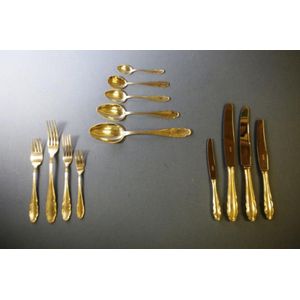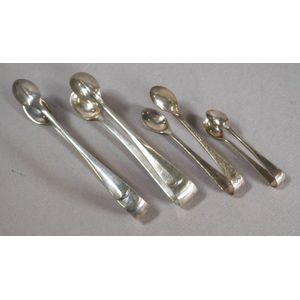Sterling Silver Flatware Set - 7 Pieces, 271g
You must be a subscriber, and be logged in to view price and dealer details.
Subscribe Now to view actual auction price for this item
When you subscribe, you have the option of setting the currency in which to display prices to $Au, $US, $NZ or Stg.
- Marrow Spoon - A spoon with a long handle and a narrow scoop shaped bowl, used to scoop and eat marrow from the hollow centre of roasted bones. Some marrow scoops are double ended with a different shaped bowl at each end.
- Flatware - An alternative name for items of cutlery, principally knives, forks and spoons, now generally used to describe sets of these implements. Nowadays it is mostly used when describing cutlery made of silver and silver plate.
It is less frequently used to describe all "flat' items of tableware, so that as well as cutlery the definition includes plates. - Hallmarks - A mark stamped on articles of precious metals in Britain, since the 14th century, certifying their purity. It derives its name from the Guild Hall of the Goldsmiths' Company, who recieved its Charter in 1327 giving it the power to assay (test the purity) and mark articles of gold and silver.
The hallmark will consist of several marks, including the:
- silver standard mark, indicating the purity of the metal. Sterling silver is .925 pure silver.
- the city mark indicating the city in which it was assayed eg London, Birmingham, York etc.
- the date mark, usually a letter of the alphabet in a particular font and case,
- a duty mark, indicating whether duty had been paid to the crown, and only in use from 1784 to 1890
The piece may include an additional mark, the maker's mark, although not forming part of the hallmark, will be located in the vicinity of the hallmarks.
Sometimes silver plated items will bear faux hallmarks, often confusing those not familiar with silver markings. - Sterling Silver - Sterling silver is a mixture of 92.5% pure silver and 7.5% of another metal, usually copper. Fine silver is 99.9% pure silver, and is relatively soft and the addition of the very small amount of copper gives the metal enough strength and hardness to be worked into jewellery, decorative and household objects.
Visually similar items

Three small sterling silver ladles, hallmarked (from smallest to largest) London 1883 (12.5 cm), 1791 (13.5 cm) and Edinburgh 1805 (15.8 cm), 61 grams

Nine Russian Imperial silver teaspoons, comprising of a pair and a set of 3 assayed 1891, with 4 various others, 185 grams approx Provenance: Owners fled Russian circa 1917 and settled in Tientsin (Tianjin) China and became part owners of Talati House Hote

Extensive set German sterling silver cutlery, total of 185 pieces, marked 800, with settings for 12. Including knives, forks, and spoons for dinner, entree and fish etc, and an additional 16 serving pieces. Total weight of all pieces, 9,372 grams approx, w

Four various sterling silver sugar tongs, hallmarked Sheffield 1913, 1921 1928 and Birmingham 1932, 11.4 cm long (largest), 88 grams
